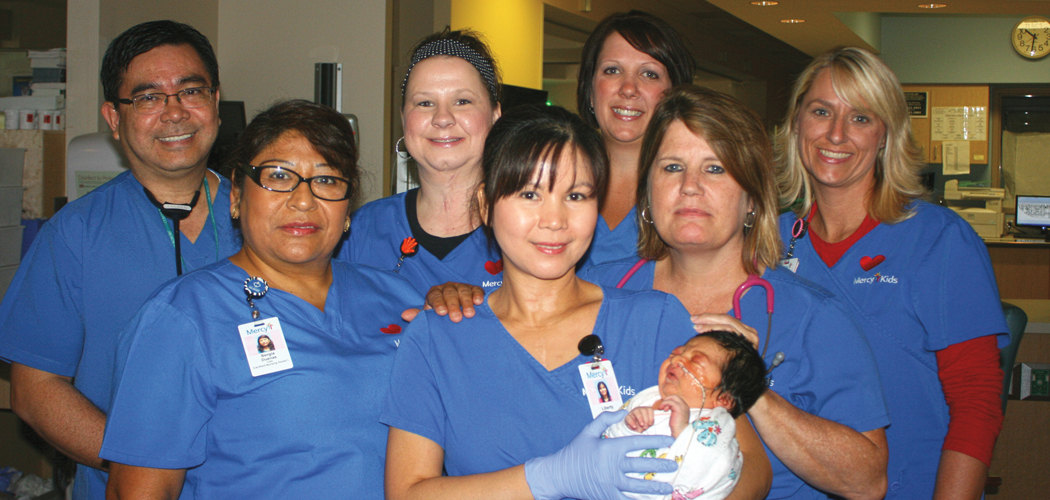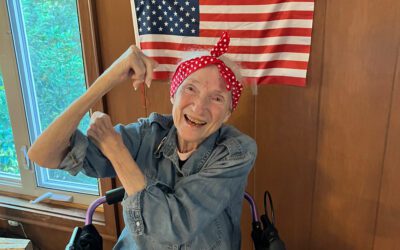[title subtitle=”words: Marla Cantrell
Images: Catherine Frederick and courtesy Mercy Fort Smith”][/title]
Each year, the Lily Award is given to a person or persons whose work has impacted those who stay in the Ronald McDonald Family Room at Mercy Fort Smith. This year’s honorees are the nurses of the neonatal intensive care unit (NICU) at Mercy. They will be recognized at the Red Shoe Shindig on Friday, October 2, at the EpiCenter by MovieLounge in Fort Smith.
The Lily Award is named in memory of Lillian Paige Pruitt, infant daughter of Susan and Clay Pruitt.
It’s a Monday morning in Fort Smith, Arkansas, one of those brittle, white hot days of summer. The air is still, not even the leaves on the trees are moving. But none of the nurses inside the Neonatal Intensive Care Unit at Mercy Women’s Center notices. In this room, on this day, they aren’t aware of anything outside these walls. What matters are the ten babies, ten sweet little babies who are fighting to get well enough to go home.
For RNs Davonna Whittenburg and Sharon Nyugen, this day brings hope and promise. They’ve seen hundreds of babies through tough times, and they’ve later had dozens of encounters — sometimes at Walmart, sometimes at the grocery store — with parents who will come up to them, will hug their necks, will nudge their healthy children toward them. “You helped save her when she was just a tiny baby,” they’ll say. Or, “Remember when he was just a tiny little baby? Remember how afraid I was?”
Both Sharon and Davonna are smiling as they talk about these meetings, how they are the best surprise you could ask for. And then Sharon says one of the truest things you’ll ever hear. “When you take care of someone’s baby and you make that baby better, you’re their friend for life.”
Davonna, who’s been a nurse for eighteen years, is nodding in agreement. “We’ve seen these families at the worst time in their life.”
Sharon add, “Ideally, parents have a picture of what’s going to happen when they have their baby. It’s always a good picture. They’re going to go in, life is going to be grand. They’re going to deliver this precious baby and they’re going to go home in two days. When they see us that means something went wrong. It could be ten days of antibiotics, or it could be something more severe. We have to support them through that, and it’s a day-by-day, hour-by-hour thing.
“Because we see so much, we see the ten days of antibiotics as routine, but it’s devastating to the family. Their ideal picture of what’s supposed to happen has been torn down. The family’s not been able to gather the way they normally would. They’ve not gotten the pictures they wanted, they’ve not been able to introduce their baby, and we have to be their support, interpret what’s going on, be with them if there’s a step back, and when there’s a step forward, and calm the situation when we need to. There’s a lot of emotion there. Sometimes when there’s a situation where things are not good, where there’s not a good prognosis, that’s even more complicated.”
During those times, when things go awry, when even the best medical care can’t save a baby, these nurses’ hearts break. They shed tears, they grieve, they hurt for the families.
But for Sharon and Davonna, even the worst outcome isn’t the end of the story. They share a deep faith, a certainty that the babies who don’t make it are in Heaven, and that their families will one day see them again.
As these two continue to talk, they begin to finish each other’s sentences. They work so well together, and they are great friends besides. Each talks about faith and how that is the foundation for everything they are and everything they accomplish.
Sharon dreamed of being a nurse long before she got the chance. She worked in radiology for fifteen years, a job where she had no interaction with patients. But she is a nurturer, and her heart told her she needed to change paths. At forty, she took the leap.
“I love everything about nursing,” Sharon says. Yes, she says, the stress is hard but she’s never had a job where she felt so needed, and where she felt she did so much good. “But if you’re not called to do it, you shouldn’t try.”
Davonna explains why they both feel that way. “It is a complicated job that requires specific skills and a tender heart. “These babies can’t talk so you have to be up on your assessment skills to know what’s going on with them. You do get a lot of communication with the family. You do have to make sure they’re okay. The mother’s either just had surgery or just gone through delivery and you have to tend to her even though she’s not your patient.
“My first day on the job I thought, What have I done. I’m serious. There’s not a lot in the adult world of critical care I had not seen. Here, it’s just so different. I was drained after the first shift, I can’t do this, I thought. But I came back, and every day I learn something new.
“In the NICU, Sharon and I and the rest of the nurses are a team.”
Sharon then picks up the story. “We all are on the same playing field and we have to be able to pick each other up and be in tune with each other. We can tell what the other is thinking without saying a word. And when we lose a baby it’s a hard, hard loss. We’re moms, and aunts and I’m a mimi, and we know how much you love your baby from the instant you see them.”
“There was a time recently when there wasn’t a staff member in the room who wasn’t crying,” Davonna says, and when she does, tears come to the surface once again.
“Being a nurse is a hard job, emotionally, physically,” Sharon adds. “Sometimes when we leave we’re on emotional overload. Many nights you may not sleep because you’re running it through your mind, if one of the babies has gotten worse. ..There are things that happen that are beyond our control but we never take it lightly. It goes with us past our twelve-hour shift.”
The talk turns then to whether what Sharon and Davonna do is a job. Neither thinks so. They call their careers a ministry, speaking for these little patients who depend on them to be their voice, to comfort the parents in their time of great need.
“I don’t believe I could do this job without God,” Davonna says. “He’s my hands, He’s my brain, He’s my heart. I know Sharon feels the same way. Without Him I don’t think I could do this job.”
Even with the stresses. Even with the days when one of their dear little patients doesn’t improve, they believe they’re doing the work that they’ve been put on Earth to do.
“Thank God we have such a great team,” Sharon says. She thinks Mercy is a great place to work, in part because she feels as if her faith is in action: when she hugs a worried mom, or prays for her little patients, or calls in a member of the clergy when things get really tough.
What they bring to these exhausted parents is comfort, knowing they can take a quick nap, or go check on their other children, because the nurses are watching over their littlest ones. That’s often the hardest part for parents, who feel torn between staying every minute they can in the NICU nursery, and taking care of themselves. What Sharon and Davonna, and the other NICU nurses do is let them know they’ve got their back, that they’ll call if they need to, that their babies are in good hands.
It is a blessing, these nurses say, that the Ronald McDonald Room, which looks like a high-rise, luxury apartment, is available for families who need it the most. It is in the same building as the NICU so parents who stay there are only seconds away if they’re needed. Meals are taken care of, there’s a washer and dryer – everything the parents need has been brought in so that they can concentrate on helping their baby get better.
Some babies have been in the nursery for as long as four months. Davonna and Sharon get attached. They’re thrilled when the babies go home but they also miss them.
Working here makes them appreciate every day, and everyone they hold dear. “There have been many times when I’ve gone home and hugged my kids and said, ‘Thank you, God.’” Davonna says. “I think many people take life for granted, and working here, you know that in one day your entire life can be turned upside down.”
Just then, Sharon says, “I may be speaking out of turn,” and then she stops for a second and looks at her friend, “but Davonna is a cancer survivor, and she’s definitely a blessing, and she knows how quickly life can be taken away.”
Davonna touches the headband that holds back her dark hair, touches her throat, and finally smiles. “I had my last treatment three years ago for breast cancer.”
“She loved her patients and took care of them the whole time,” Sharon says.
“I had two small children, and a wonderful support system. God gets all the credit. I wasn’t in the NICU then. I’d lost all my hair. Everyone was so kind.”
That brush with mortality only strengthened Davonna’s faith and her belief that being a nurse is her true calling.
Davonna and Sharon are quick to point out that their story is not unique. The rest of the nurses are just as devoted, just as meticulous in their care of these little ones. “I wish you could talk to all the nurses,” Davonna says. “You’d see.”
It is time to leave the break room then. There is much work left to do in their twelve-hour day, and there are ten precious babies just down the hallway, getting better under their care, getting stronger each day. They are eager to get back to them.
One day they may see them again, at the mall, at a local restaurant, in line at the movies. Their parents will recognize Sharon and Davonna, they will call them out, they will show them their strong, beautiful children and thank them again for their loving kindness.
[separator type=”thin”]
Former recipients of the Lily Award:
2011 — (the inaugural award) Dr. Victor Coloso, the neonatologist at Mercy who was one of the driving forces behind bringing the Family Room to Mercy.
2012 — Evan’s Project Photographers. Evan’s Project photographers come to the NICU once a month or at special request and take portrait quality photos of the babies in the NICU at no charge to the families.
2013 — Michael and Michelle Hadley. Michael serves on the RMHC of Arkoma Board of Directors, and chairs the Family Room Advisory Council. Michelle participates in the share-a-meal program and is instrumental in putting together the annual Red Shoe Shindig.




